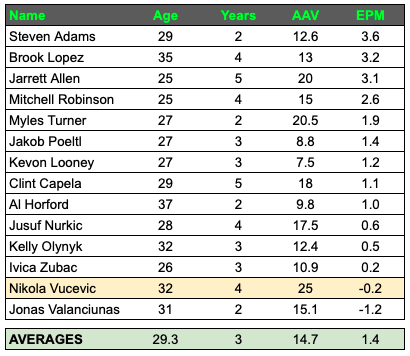© 2026 ALLCITY Network Inc.
All rights reserved.

This will be a massive offseason for the Bulls, but they have decisions to make.
Do they shake up the roster or run it back?
If they want to run it back, can they do so without going into the luxury tax?
At his end-of-season presser, Arturas Karnisovas suggested a “blow it up” style rebuild was not on the front office’s mind, but given the salary cap realities, adjusting the roster without a larger trade (one or more of the big three) will be a difficult challenge to overcome.
With those bigger deals off the table (for the time being), the Bulls’ future outlook starts with Nikola Vucevic’s free agency. The former All-Star is coming off another underrated and underappreciated season in which he played all 82 games, and averaged 17.6 points, 11 rebounds and 3.2 assists (all identical to 2021-22) while boosting his shooting percentages to 52 percent from the field, 34.9 percent from three and 83.5 percent from the free throw line. His shooting efficiency in both effective field goal percentage and true shooting percentage were career highs and he anchored the fifth-best defense in the league.
Despite his production, Vucevic is entering his age 33 season and the Bulls, given their tight cap sheet, must pay him for what he will do on his next contract, rather than what he accomplished on his previous one.
The Bulls have to play the market. Looking into the other teams with space, presently, only the Rockets ($47M), Pacers ($13M), Spurs ($7M), Magic ($4.7M) and Pistons ($3.3M) have cap space. While unlikely, up to 10 more teams (Jazz, Thunder, Hornets, Lakers, Kings, Mavericks, Blazers, Cavaliers, Bulls and Timberwolves) could open up space if they wipe their cap holds.
That leaves only a few Vucevic suitors out there, before considering positional need and timeline. The Pacers just extended Myles Turner. The Pistons have a glutton of centers. Any of those teams could land Victor Wembanyama in the draft and none of them are win-ready options.
Sign-and-trade options exist, but that will be out of the Bulls control. Instead, what they should worry about is determining fair market value such that they can retain flexibility while paying Vucevic what he deserves as a former All-Star entering his mid-thirties.
To do so, we can investigate contracts other centers have signed to determine a going rate, sorted by the best available all-in-one metric, EPM.

Despite his per-game production, Vucevic rates out near the bottom of the Estimated Plus-Minus list for similar players. Entering his age 33 season, he is also one of the oldest.
However, Vucevic is one of just four players to have made an All-Star team, and holds the most offensive responsibility of anyone on the list. He is likely the least replaceable center on the list given what the Bulls gave up to acquire him, his versatility relative to the other players and how he factors into the offense.
Getting a similar contract to Brook Lopez or Al Horford, two of the other All-Stars on the list, would be a team-friendly deal that likely wouldn’t make sense for Vucevic considering his age. That would be less than average for this group.
But the Bulls likely can’t afford to give him Myles Turner or Jarrett Allen money.
Given his pedigree and importance, an “average” contract of three years, $45 million would give him security through his age 35 season, but he likely wouldn’t want to be paid less than Clint Capela, Jusuf Nurkic and Jonas Valanciunas.
The Bulls will likely have to find a middle ground between the average $15 million per year number and the high point of roughly $20 million per year.
Using Stephen Noh’s simple salary projection model, which factors projected games played, minutes per game and EPM, while adjusting for salary cap inflation, Vucevic’s projected annual value is $18.2 million, and that feels spot on.
Locking up Vucevic on a three-year, $54 million deal represents a middle ground that should satisfy both parties. Vucevic is paid a figure that reflects his past contributions without overpaying him for his projected future production. The Bulls maintain flexibility with a tradeable contract and enough space to secure the rest of their free agents.
Looking at this in a vacuum is a useful exercise to find relative market value, but it’s not the only consideration.
The Bulls also have restricted free agents in Coby White and Ayo Dosunmu, an aging roster that hasn’t reached its goal and other holes to fill if they want to improve on the current group.
Would they consider a shorter-term deal to open up future pathways outside the current core? Would a player option allow the Bulls to go a little lower on dollars? Do the Bulls need to offer above-market rate to make sure he doesn’t go anywhere? Do the Bulls even want to be in the Vucevic business anymore or are they ready to move on? Most importantly, does Vucevic, who was relegated to third option and who has been endlessly ridiculed by the fanbase, actually want to return to Chicago?
The Bulls have a lot of questions that need to be answered before the start of next season.
And it all begins with Vucevic.
Get Chicago's Best Sports Content In Your Inbox!Become a smarter Chicago sports fan with the latest game recaps, analysis and exclusive content from CHGO’s writers and podcasters!
Just drop your email below!
Comments
Share your thoughts
Join the conversation


